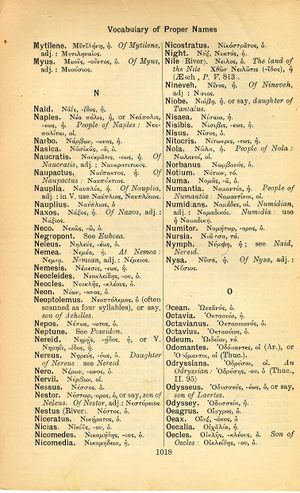Numa: Difference between revisions
ἀλλὰ διὰ τῆς ἀγάπης δουλεύετε ἀλλήλοις. ὁ γὰρ πᾶς νόμος ἐν ἑνὶ λόγῳ πεπλήρωται, ἐν τῷ Ἀγαπήσεις τὸν πλησίον σου ὡς σεαυτόν → but be enslaved to each other through love; for the whole Torah is fulfilled in one statement: You will love your neighbor as yourself (Galatians 5:13f.)
(3_9) |
m (Text replacement - "}}]]" to "}}]]") |
||
| Line 1: | Line 1: | ||
{{WoodhouseENELnames | {{WoodhouseENELnames | ||
|Text=[[File:woodhouse_1018.jpg|thumb | |Text=[[File:woodhouse_1018.jpg|thumb | ||
|link={{filepath:woodhouse_1018.jpg | |link={{filepath:woodhouse_1018.jpg}}]]Νομᾶς, -ᾶ, ὁ. | ||
}} | }} | ||
{{Lewis | {{Lewis | ||
Revision as of 10:11, 15 August 2017
English > Greek (Woodhouse)
Νομᾶς, -ᾶ, ὁ.
Latin > English (Lewis & Short)
Nŭma: ae, m.,
I a Roman proper name.
I Numa Pompilius, the second king of Rome, Liv. 1, 18 sq.; Cic. Rep. 2, 13, 25; 2, 18, 33; Ov. F. 2, 69; id. ib. 3, 305 sqq.; Juv 3, 16; 8, 156 al.—
II Numa Marcius (Martius), a Sabine, a friend of the former and high-priest, Liv. 1, 20; Tac. A. 6, 11.
Latin > French (Gaffiot 2016)
Nŭma,¹⁰ æ, m., Numa Pompilius [deuxième roi de Rome] : Liv. 1, 18, 1 ; Cic. Rep. 2, 25 ; Ov. F. 2, 69.
Latin > German (Georges)
Numa, ae, m. (Stamm NUM, wov. auch numerus, num-mus), der Ordner, Gesetzgeber, Name des zweiten röm. Königs, s. Pompiliusdas Nähere.

